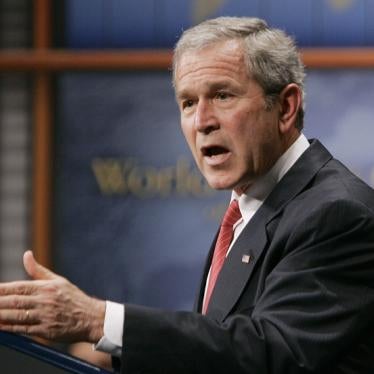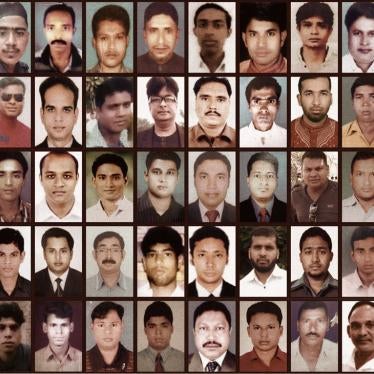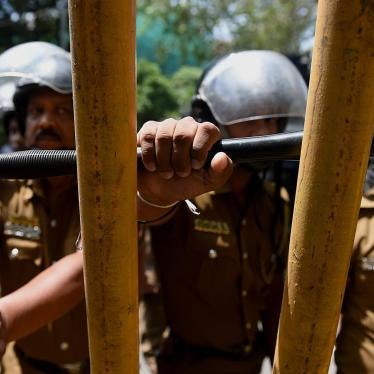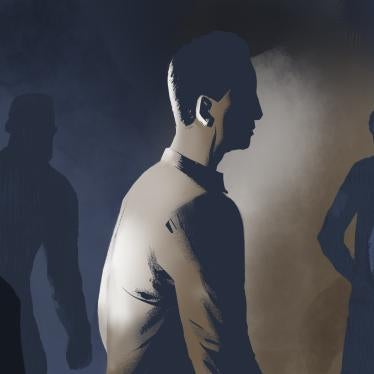Torturers can run but they can’t hide. And regardless of who they are or how powerful, they will be named, shamed and forever pursued. In February 2011, former US president George W Bush cancelled a trip to Switzerland, where alleged victims of torture had intended to file a criminal complaint against him. An investigation implicating US officials in torture is under way in Spain. Suddenly, unexpectedly, Bush and key members of his administration find the world a much smaller, unfriendly place.
Those who engage in such practices in Pakistan would be well advised to take note.
In July, Human Rights Watch released a 107-page report, “Getting Away with Torture: The Bush Administration and Mistreatment of Detainees”, which presents information warranting criminal investigations of former US president George W Bush and senior administration officials, including former vice-president Dick Cheney, defence secretary Donald Rumsfeld and CIA director George Tenet, for ordering practices such as waterboarding, the use of secret CIA prisons and the transfer of detainees to countries where they were tortured.
International law binding on the US obliges President Barack Obama to order criminal investigations into allegations of detainee abuse authorised by Bush and his other senior officials. The evidence of torture by the Bush administration is overwhelming. Bush publicly admitted that in two cases he approved the use of waterboarding and authorised illegal CIA secret detention and renditions programmes. Cheney was the driving force behind the illegal policies, chairing key meetings at which specific CIA operations were discussed, including waterboarding. Rumsfeld approved illegal interrogation methods amounting to torture. Former CIA director Tenet authorised and oversaw the CIA’s use of waterboarding, stress positions, light and noise bombardment, sleep deprivation and other abusive interrogation methods, as well as the CIA rendition programme.
Torture and other ill-treatment is unequivocally prohibited by the Convention against Torture and by the Geneva Conventions during wartime. The prohibition against torture is one of the most concrete of human rights. The Bush administration undermined this universal prohibition by contorting, beyond recognition, the legal definition of torture.
Defining torture as it had never been defined before, Bush’s Justice Department produced memos claiming that the “severe pain and suffering” threshold necessary to be considered torture had to rise to the level of “organ failure or serious impairment of body functions”. This definition — and a CIA secret detention programme — paved the way for an untold number of abuses by members of the military, the CIA and others carrying out Bush administration interrogation policies.
Bush sought to justify his authorisation of waterboarding on the ground that Justice Department lawyers said it was legal. While Bush should have recognised that waterboarding — a form of mock execution in which the victim nearly drowns — constituted torture without consulting a lawyer, there is also information that senior officials, including Cheney, sought to influence the lawyers’ judgment. The strategy to shape and hand-pick legal advice and then hide behind it only deserves to be rejected.
While the Obama administration has correctly decided to end abusive interrogation practices, unfortunately, President Obama has treated torture under Bush as an unfortunate policy choice rather than a crime. Hence, Obama’s policy change will remain easily reversible unless the legal prohibition against torture is clearly re-established. Yet, so far, not just Bush but the Obama administration too has successfully kept courts from considering the merits of torture allegations in civil lawsuits by making broad use of legal doctrines such as state secrets and official immunity.
If the US government does not pursue credible criminal investigations, other countries should prosecute US officials involved in these crimes in accordance with international law. They can pursue investigations and, if warranted, prosecutions before national judicial systems under the doctrine of ‘universal jurisdiction’. Universal jurisdiction is a crucial tool by which victims of grave international crimes can obtain redress. It acts as a ‘safety net’ when the state with the most direct jurisdiction over the crimes is unable or unwilling to conduct an effective investigation and trial.
If today, Bush and senior administration officials find themselves in this harsh spotlight, those who were complicit in the administration’s abusive policies should recognise that they too may eventually be held accountable.
Following the US-led invasion of Afghanistan in 2001, Pakistani authorities rounded up suspected members of al Qaeda and the Taliban. During the Bush administration, several hundred Pakistanis and foreign nationals living in Pakistan were simply taken into custody and handed over to the US without any due process. Many were then held at Bagram Airbase in Afghanistan or transferred to Guantanamo Bay in Cuba. Undoubtedly, many were tortured or otherwise ill-treated.
Former president Pervez Musharraf explained his collaboration in the Bush administration’s abuse with some pride in his 2006 autobiography, In the Line of Fire: “We have captured 689 and handed over 369 to the United States. We have earned bounties totalling millions of dollars. Those who habitually accuse Pakistan of not doing enough in the war on terror should simply ask the CIA how much prize money it has paid to the Government of Pakistan.”
The CIA should not just be asked how much prize money it paid. It should — and someday will — be asked how far it was complicit in abuses including enforced disappearances, torture and illegal detention by the ISI and others in the Pakistani military. Today, evidence has been presented against Bush, his cabinet and his intelligence chief. Tomorrow, it may well be presented against Musharraf, his cabinet and his intelligence chief. Nobody is in office forever. And as Bush is beginning to discover, crimes have a way of catching up even with the most powerful of abusers.
Ali Dayan Hasan is Pakistan director at Human Rights Watch.







